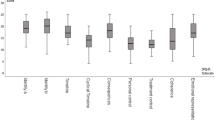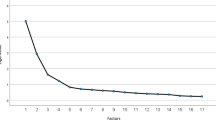Abstract
Although depression and anxiety syndromes are common in primary care, many depressed and anxious patients fail to receive effective treatment. Little attention has been given to the role of illness beliefs in shaping these patients’ treatment preferences and decisions. Using semistructured interviews, this study examined conceptual models of depressive symptoms among patients in an inner-city clinic. A theoretical taxonomy of patients’ conceptual models of distress was developed: each category was associated with a unique pattern of treatment preferences. We conclude that patients’ models of distress may play an important role in treatment-seeking decisions, and deserve further investigation.
Similar content being viewed by others
References
Katon W, Rutter C, Ludman EJ, et al. A randomized trial of relapse prevention of depression in primary care. Arch Gen Psychiatry. 2001;58:241–7.
Lin E, VonKorff M, Katon W, et al. The role of the primary care physician in patients’ adherence to antidepressant therapy. Med Care. 1995;33:67–74.
Simon GE, Goldberg SD, Tiemens BG, Ustun TB. Outcomes of recognized and unrecognized depression in an international primary care study. Gen Hosp Psychiatry. 1999;21:97–105.
Katon W, VonKorff M, Lin E, Bush T, Ormel J. Adequacy and duration of antidepressant treatment in primary care. Med Care. 1992;30:67–76.
Weiss M, Raguram R, Channabasavanna S. Cultural dimensions of psychiatric diagnosis: a comparison of DSM-III-R and illness explanatory models in South India. Br J Psychiatry. 1995;166:353–9.
Goldberg D, Gater R, Sartorius N, et al. The validity of two versions of the GHQ in the WHO study of mental illness in general health care. Psychiatry Med. 1997;27:191–7.
Baumann LJ, Cameron L, Zimmerman RS, Leventhal H. Illness representations and matching labels with symptoms. Health Psychol. 1989;8:449–69.
Kleinman A, Eisenberg L, Good B. Culture, illness, and care: clinical lessons from anthropologic and cross-culture research. Ann Intern Med. 1978;88:251–8.
Author information
Authors and Affiliations
Corresponding author
Rights and permissions
About this article
Cite this article
Karasz, A., Sacajiu, G. & Garcia, N. Conceptual models of psychological distress among low-income patients in an inner-city primary care clinic. J GEN INTERN MED 18, 475–477 (2003). https://doi.org/10.1046/j.1525-1497.2003.20636.x
Issue Date:
DOI: https://doi.org/10.1046/j.1525-1497.2003.20636.x




